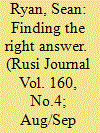| Srl | Item |
| 1 |
ID:
140950


|
|
|
|
|
| Summary/Abstract |
Rapid changes in technology and the democratisation of information capabilities have sparked the concept of ‘War in the Information Age’. Intelligence branches within NATO militaries have been slow to adapt and risk being outpaced. Sean Ryan, a former British military intelligence officer, argues that while some structural changes have occurred, lessons from the Afghanistan and Iraq campaigns about the nature of modern intelligence have not yet been learned, and fundamental changes to the doctrine, training and culture of military intelligence are required.
|
|
|
|
|
|
|
|
|
|
|
|
|
|
|
|
| 2 |
ID:
152524


|
|
|
|
|
| Summary/Abstract |
This paper examines intra-household and socio-cultural factors leading to differential outcomes in educational attainment by gender and birth order amongst smallholder oil palm households in Papua New Guinea. Not all children share equitably in the household resources allocated to education: females have lower average education levels than males, and high birth order children have higher education attainment than lower birth order siblings, indicating preferential parental investment in sons and early born children. The findings demonstrate that despite households having regular access to relatively high incomes from oil palm and residing in close proximity to schools, primary school net enrolment rates remain significantly lower than those for East Asia and the Pacific region, and the millennium development goal of universal primary education has not been met. This finding is likely to be the result of a combination of intra-household factors including gender power imbalances, low parental education levels, the agency of youth in educational decision-making and the weakening attraction of education as a means of improving income-earning potential.
|
|
|
|
|
|
|
|
|
|
|
|
|
|
|
|